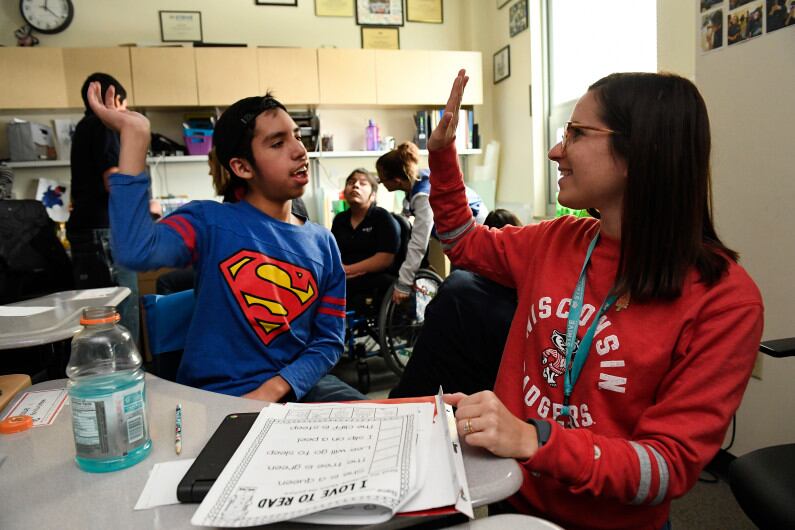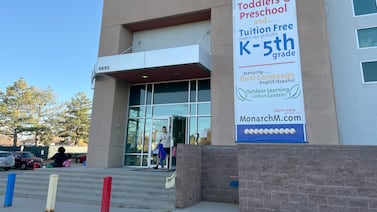Colorado charter schools serve far fewer students with disabilities than district-run schools do. The gap means those students don’t have access to the same educational opportunities as their peers, and school districts end up serving a larger share of students who require expensive services.
Colorado charter leaders say they’re willing and able to do better — if they have more authority and resources. They’re backing a bill that would let charter networks and groups of schools assume full legal responsibility for educating students with disabilities, as well as take control over state and federal funding that currently flows to school districts.
“Charter schools have simply not had access to the same legal structures that would allow them to serve greater percentages of students with disabilities,” said Dan Schaller, president of the Colorado League of Charter Schools.
House Bill 1294, which received unanimous bipartisan support Thursday in the House Education Committee, is a top priority for the League. Bill sponsor state Rep. Mary Young, a Greeley Democrat and former special education teacher, said the effort represents an evolution on the part of charter schools, though she’s not sure how many ultimately will take on the substantial legal responsibilities involved.
“This bill demonstrates the commitment and interest of some charter schools to participate fully in educating special education students,” she said.
But to serve students well, the state will need to exercise strong oversight, and charter schools will need to be realistic about the costs and obligations involved, said Alex Medler, executive director of the Colorado Association of Charter School Authorizers.
“If the state is going to pursue a change like this, they should explore the capacity of all stakeholders to do their jobs well and whether students would really get to be making choices,” Medler said.
Students with disabilities have fewer choices
About 15% of Colorado students — 134,000 pupils — attend charter schools. Publicly funded but independently run, charters can be authorized by school districts or by the state Charter School Institute. They range from Montessori and expeditionary learning schools to college preparatory and classical curriculum models.
On average, just 7.4% of Colorado charter students have what’s known as Individualized Education Programs to address disabilities. That contrasts with 11.6% of students statewide and is less than charter schools in most other states.
The reasons are complex. A recent report surveying parents of students with disabilities found some parents felt school staff discouraged them. Others said charters didn’t have the right services.
“My son is considered more high-functioning than anything, but even still, it wouldn’t be a good fit for him, but they at least told me that,” one parent who opted not to enroll her child in a charter school told researchers.
Medler said a mix of outdated stereotypes and real challenges get in the way. Some parents think charters don’t serve students with disabilities. Some charter schools want to do better but don’t have a supportive relationship with their district.
Advocates say children with disabilities deserve real choices.
“Parents want a school that welcomes their child and where their child is making progress, and sometimes their child is not making that progress in the traditional school,” said Pam Bisceglia of Advocacy Denver. “Some families say their child does really well at a particular charter school because the rituals and routines are so well defined, and for other parents, that routine is the reason their child struggles.”
When Liz Rodriguez was looking for a middle school for her son Julian, who has ADHD, she was attracted to the small class sizes and careful routines at STRIVE Prep, a Denver charter network. Now a senior preparing to graduate, Julian has had a supportive team cheering him the whole way.
“They had a lot of structure, and that’s what I needed for him, for him to have a structured environment where he could focus,” Rodriguez said.
Medler said Denver Public Schools and STRIVE Prep show what can be achieved within existing legal structures. Denver uses a single enrollment system for all schools and also locates programs for students with more significant needs within charter schools. The STRIVE Prep charter network, meanwhile, has embraced the work. Nearly 15% of STRIVE Prep students have disabilities, higher than the district average.
Founder and CEO Chris Gibbons said the network overhauled its programs to reduce staffing ratios, hire more classroom aides, and emphasize co-teaching, in which general education and special education teachers work side-by-side in the same classrooms. To pay for this, the network supplements public dollars with private philanthropy.
Bill would give charters more resources and responsibility
Currently, the responsibility for meeting students’ educational needs lies with school districts and groups of small districts known as BOCES that have banded together to pool resources. These administrative units, as they’re known in the special education world, oversee programming, make placement decisions, and bear the legal responsibility for ensuring all children get an appropriate education.
The state Charter School Institute is also considered an administrative unit.
They receive extra state and federal money for students with disabilities, but those funds cover only about 35% of the additional costs of educating those students. The rest comes from school districts’ general operating budgets.
Charter schools generally receive just a portion of the money for students with disabilities and pay fees to the district to cover administrative costs and centralized services.
Charter school leaders say districts don’t always make clear what those fees cover or provide adequate services. Several charter school leaders told lawmakers having more money and flexibility to design programs and hire providers would allow them to improve services.
Charter schools also don’t have the freedom to enroll any student whose parents are interested. Instead, the school district may decide the charter school can’t adequately serve the student and send them elsewhere.
As administrative units, school districts bear the ultimate legal responsibility if a student’s educational plan isn’t followed, said Lucinda Hundley of the Colorado Consortium of Directors of Special Education. If they deny a charter school placement, it’s because they don’t believe the school can meet that student’s needs.
The proposed law would enable charter schools that meet certain criteria to make those decisions themselves. Charter school networks or collaboratives could apply to the Colorado Department of Education to become their own administrative unit, while remaining part of their school district in other ways. They also could apply to join the Charter School Institute just for purposes of special education — an option that may be more viable than forming their own unit.
“We’re trying to create additional pathways to have charter schools serve students with special needs,” Schaller said.
With 10 schools serving 3,300 students, STRIVE Prep is larger than many Colorado school districts. Gibbons said he would weigh the pros and cons of forming a separate administrative unit, which might let him do things like maintain a specialized center the district plans to close.
“While our partnership with Denver Public Schools is strong, those flexibilities have been hard-earned and have not always been true,” he said, and not every district is as supportive as Denver. “This bill allows for charter schools with that passion and focus to access that level of independence much more rapidly.”
School districts support the bill’s goals, but they’re seeking amendments to ensure charter schools won’t recoup costs from school districts for services that can run tens of thousands of dollars a year beyond state and federal funding.
“We do want to ensure school districts are not held responsible for excess costs and that the charter school units are responsible for the totality of educating a child with a disability, both in terms of services and costs,” Hundley said.
Bill sponsors say that’s their intent — that charter-run administrative units would not be able to turn students away and would be responsible for their education in every way.
Some advocates say charter schools should look at their own culture and practices before pursuing new legal authority. Recent state rule changes ensure charters don’t ask about IEP status before enrolling students and require more staff training. Another rule change under consideration would give parents a voice when districts and charters disagree about where a student is best served.
While many charters have improved, Bisceglia said she continues to hear from parents who have been told their child is not a good fit — and from administrators who don’t see the problem.
“We do continue to hear from just about every charter school, ‘We’re a school of choice, and if you don’t like how we do things here, another student would take your place,’” she said.
Bureau Chief Erica Meltzer covers education policy and politics and oversees Chalkbeat Colorado’s education coverage. Contact Erica at emeltzer@chalkbeat.org.







